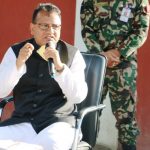Despite unfolding democratic change in Nepal, political representation in policy decision making has remained extremely limited, and has even worsened.
In Nepal, the current politics surrounding the development of new constitution is fundamentally about defining who exercises public power and how. The first Constituent Assembly (CA), which was elected in 2008, failed to deliver the constitution despite four years of extended tenure. The main reason for this failure was that it could not resolve the political differences among diverse groups on the issue of power sharing, even though the CA itself was fairly inclusive in terms of representation. The elected representatives did debate various aspects, but without any conclusive agreement.
When compared to a completely different policy discourse, like Climate change for example, Nepal was able to craft several climate change related policies during the same period when the CA was alive (2008-2012). These climate policies including the Climate Policy 2011 and National Adaptation Program of Action (NAPA) 2010, unlike the constitutional process, did not involve enough debates. Likewise, several other sectoral policy decisions were made in the country. They were driven largely by scientists, bureaucrats, consultants, and donors. Partly because they were less politicised, they happened to be ‘successful’. Behind a success or failure, who makes decision is important.
Now that new CA is in place, it is time to explore again whether decisions are being made in the right way, and more fundamentally, to take stock of the how political power is exercised in the country. This question becomes central to understanding possibility of democracy. To understand this, we need to engage with a few basic questions.
Whose views count?
It needs to be questioned whether policy decisions represent the views of those most affected by the policies. Those who were most influential in climate policy formulation, for example, are those who do not have to honour the policies they help create (most of the contributors were international actors and donors). We can say that, in the case of climate policy, the narrative that has been advanced by the powerful actors in policy process is this: science has generated facts about Climate change, and also offered recommendations, so come, listen, and endorse the recommendations already on the table.
Decision makers are also urged to make decisions without delay, as scary calculations show the cost of the delay in decision. Climate change policy has thus become a technocratic drama—serving the political interests of a narrow group of transnational climate elites spread across governments, civil society, the scientific community, donor agencies and expert consultancies. I am not denying the role of these players—the question is how external actors contribute without distorting the endogenous policy politics from outside. And my argument is simple: do not impose public policy on others in the name of scientific fact and urgency.
The issue of representation in policy process is particularly critical as Nepal is burning for inclusion and democratic transformation. In the same way that addressing climate crisis, if at all, must not trigger crisis in our society, so is the case with the constitutional agenda. Clearly, policies crafted for one group of people by another are not only unethical, but also unlikely to be fully implemented for lack of wider ownership. Nor will they be likely to benefit those who were not involved.
So why doesn’t policy politics reflect the views of those most affected? At a more generic level, three anti-democratic dispositions are at the root of such policy crisis in Nepal. First is the feudalistic attitude of the political leaders, who consider issues like Climate change as a technical issue, which can be fixed through a bureaucratic state. Climate justice has not become an agenda of political discourse or electoral campaign. When it comes to the constitution however they considered that it could only emerge if there is a consensus among the top leaders of major political parties—they undermined the role of an elected CA in constitutional deliberation. Political leaders are becoming ever more unaccountable to citizens. The political channel of representing people has apparently broken. There is no sign of transformation of this attitude in sight, despite sporadic cases of honesty and openness demonstrated by some individuals.
Second, the bureaucratic approach is reinforced by the last 50 years of aid in Nepal. The aid industry has nurtured apolitical subjects and impregnated the policy deliberation system with apolitical and alien tools. To borrow the words of Nanda R Shrestha, development support to Nepal is “predefined and predetermined in accordance with the Westerners’assumption of superiority of their economic rationality, imbued with techno-fetishism”. This means, in Shrestha’s words, “They continue to treat Nepal like a retarded child, thus further tightening the loop of dependency on Western monies and material values”. Climate policy was squarely within such developmentalist dispositions—enforced through the incentives of money, “superiority”of knowledge and strategic power. I am not against considered response to climate crisis; but vehemently against using issues like climate crisis to hijack democratic politics so vital to effective public policy. Constitutional politics also suffered the same challenge—just recall the billions of rupees spent and the dozens of international agencies that lunched projects to contribute to Nepal’s new constitution. Aid power is the elephant in the room, and no one critically reflects, reviews and discusses it.
Third, despite the development of a vibrant civil society in the recent years, the actual channels of representation have been broken and strategically manipulated. On a positive note, civil society movements—including those voicing issues of caste, gender and ethnic identities—have significantly influenced public policy. However, these movements are also facing problems of internal accountability and also prone to external influence. The irony is that with the growing involvement of NGOised civil society, external interest has found its way into policy politics. It is difficult to envision how these movements become more internally accountable and autonomous, and then become more effective in advancing the voice of disadvantaged groups in the public policy processes. Going back to climate policies to illustrate, they have been produced with plenty of civil society and NGOs involvement, but paradoxically without any fundamental opposition from the latter. The whole aid-fuelled political economy of Climate change policy field has homogenised actors to think and act as per the signals coming from outside, rather than exploring and articulating the dreams and aspirations of diverse groups of local people.
Opportunity
We need to improve the ways in which science does its business and how voices are channeled, and simultaneously level the political playing field. First, a new science of politics should confront the values of citizens and stakeholders, in addition to generating factual analysis. Second, we need to revitalize—and at times de-NGOise—the civil society. Third, politicians should understand the basics of policy around not just the hot political issues but also the less urgent issues (in their perspective) such as gradual Climate change. Fourth, donors should not impose and sell their ideas; they should learn how they can support local process of change, without structuring the playing field from their perspective. Finally, public administrators should engage openly with the public in policy processes. Both Climate change and constitutional policy —and all others in between—can have real chances of success if we genuinely advance an accountable science and responsive politics.
Earlier version of this article was published in The Kathmandu post.






